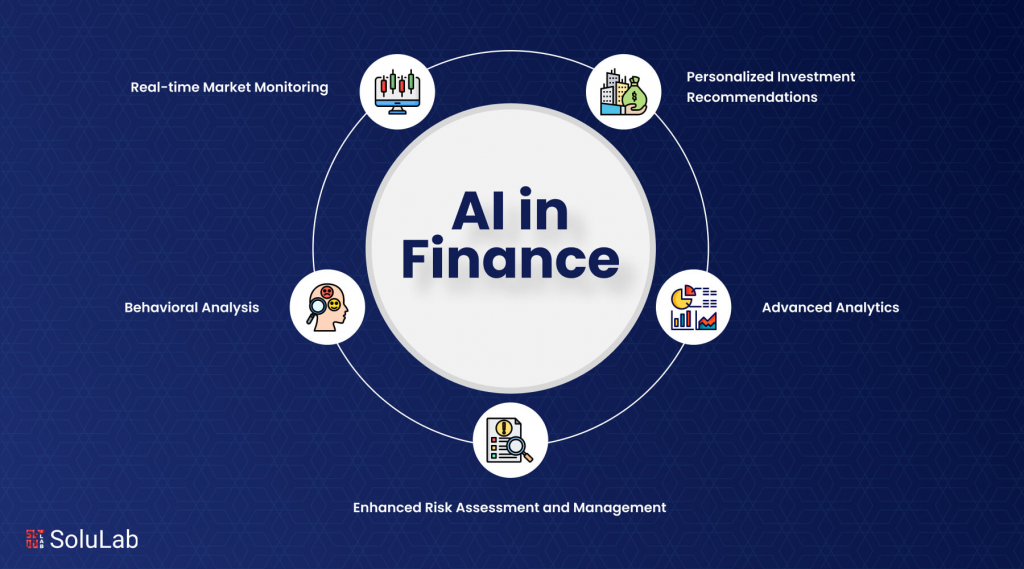Artificial intelligence (AI) is transforming the world of personal finance. From robo-advisors managing investments to smart budgeting apps predicting your spending patterns, AI is quickly becoming a vital tool for individuals looking to optimize their financial lives. But with this rapid advancement comes a new set of questions about privacy, bias, and the role of human decision-making.
This article explores the key ways AI is reshaping personal finance, the opportunities it presents for consumers, and the ethical considerations that must be addressed as these technologies evolve.
How AI Is Changing Personal Finance
1. Personalized Financial Planning
AI-driven platforms can analyze an individual’s income, expenses, debt, and goals to create highly tailored financial plans. Tools like Mint, Cleo, and YNAB use algorithms to help users budget more effectively and spot trends in their financial behavior.
2. Robo-Advisors and Automated Investing
Robo-advisors like Betterment, Wealthfront, and Schwab Intelligent Portfolios use algorithms to build and manage portfolios based on individual goals and risk tolerance, making investing more accessible.
3. Credit Scoring and Risk Assessment
AI models now assess creditworthiness using alternative data like rent or utility payments giving more people access to credit, especially those without a traditional credit history.
4. Fraud Detection and Security
Machine learning algorithms detect anomalies in spending behavior and help banks alert users of fraud in real time.
5. Customer Support and Virtual Assistants
AI chatbots like Bank of America’s Erica or Capital One’s Eno help customers get 24/7 financial support, from tracking spending to setting up reminders.

Opportunities for Consumers
1. Greater Financial Inclusion
AI-driven platforms enable people in underserved areas to access banking, loans, and investments via mobile devices.
2. Cost Savings
With automation reducing overhead, many AI-powered tools offer low-cost or free services, especially in budgeting and investing.
3. Better Financial Decisions
AI can identify patterns and suggest actions like reallocating spending or optimizing investments that may be overlooked by humans.
4. 24/7 Financial Management
Consumers gain round-the-clock access to advice and insights, enhancing convenience and control over personal finances.
Ethical Challenges and Concerns
1. Data Privacy
AI requires large amounts of data. Users must trust that financial apps will safeguard sensitive information and avoid misuse.
2. Algorithmic Bias
Bias in training data can result in unfair outcomes, such as denying credit based on gender, race, or socioeconomic status.
3. Transparency and Explainability
If users don’t understand how AI arrives at decisions, trust can erode especially when those decisions impact loan approvals or investment choices.
4. Over-Reliance on Technology
Automated systems can reduce financial literacy and cause users to rely too heavily on tools they don’t fully understand.
5. Regulatory Gaps
Laws often lag behind tech innovation. Stronger guidelines are needed to ensure consumer protection and ethical AI development.
Using AI Responsibly
1. Choose Reputable Tools
Use apps with strong security protocols and transparent privacy policies. Look for user reviews and industry endorsements.
2. Maintain Financial Literacy
Even with AI’s assistance, it’s important to understand your finances. Use AI to enhance your knowledge, not replace it.
3. Protect Your Data
Use multi-factor authentication and monitor your accounts regularly. Don’t share personal info with unverified platforms.
4. Advocate for Ethical AI
Support companies and policies that promote fairness, inclusivity, and responsible AI development in finance.

The Future of AI in Personal Finance
What’s next? AI is moving toward even more advanced roles:
- Tax optimization using real-time income and expense data
- Emotion-aware tools that detect financial stress and adjust advice
- Integrated platforms combining budgeting, investing, debt management, and wellness
- Voice-activated financial assistants that sync across all your devices
But these innovations must go hand-in-hand with ethics. Ensuring fairness, transparency, and equitable access will define whether AI truly benefits everyone.
Artificial Intelligence in Personal Finance: A Deep Dive into the Future of Money Management
Artificial intelligence (AI) is transforming the world of personal finance at a pace never seen before. What started with basic budgeting tools and automated reminders has evolved into a full-fledged ecosystem of financial decision-making driven by algorithms.
From robo-advisors that manage your portfolio while you sleep to AI tools that predict your spending habits with uncanny accuracy, the technology is becoming not just a convenience, but a critical element in how people plan, save, and invest. Yet, as with all powerful innovations, it brings both opportunities and challenges.
The Expanded Impact of AI on Personal Finance
1. Hyper-Personalized Financial Planning
Traditional financial advice often came from generic models or human advisors who used broad categories to guide clients.
Today, AI systems analyze thousands of data points—from your utility bills to your subscription history—to craft individualized strategies.
For example:
- Mint uses machine learning to automatically categorize expenses and set realistic budget limits.
- Cleo offers chatbot-style guidance, even “roasting” you if your spending is out of control, making money management more engaging for younger users.
- YNAB helps allocate every dollar to a specific purpose, training users to break the paycheck-to-paycheck cycle.
2. Automated Wealth Building Through Robo-Advisors
Robo-advisors have democratized investing, once a field dominated by those with large portfolios and high advisory fees. Platforms like:
- Betterment – Uses goal-based investing and tax-loss harvesting automatically.
- Wealthfront – Offers diversified ETF portfolios with automated rebalancing.
- Schwab Intelligent Portfolios – Integrates cash management and personalized advice with no advisory fees.
These tools allow even beginners to invest with institutional-level portfolio management, often with starting amounts as low as $10–$100.
3. Revolutionizing Credit Scoring
Conventional credit scores like FICO rely heavily on past debt behavior. AI-enhanced models are now factoring in alternative data:
- Rent payment history
- Utility bills
- Freelance income patterns
- Online transaction histories
Startups like Upstart use AI to assess credit risk in a way that can approve borrowers overlooked by traditional scoring, improving financial inclusion.
4. Advanced Fraud Detection
AI’s pattern recognition capabilities are redefining fraud prevention.
Example: Visa’s Advanced Authorization and Mastercard’s Decision Intelligence scan millions of transactions in milliseconds, detecting anomalies far faster than humans could.
5. Conversational Banking with AI Assistants
Chatbots like Erica (Bank of America) or Eno (Capital One) are now able to:
- Answer questions about spending trends
- Warn about unusual account activity
- Suggest ways to save money
- Remind you of upcoming bills
This 24/7 support reduces dependence on human agents and makes financial information instantly accessible.
Opportunities Created by AI in Personal Finance
- Wider Financial Inclusion – Remote communities gain access to digital banking without needing a physical branch.
- Lower Costs – Automation means fewer manual processes, lowering service costs.
- More Informed Decisions – AI highlights risks and opportunities you might miss.
- Time Savings – Financial management that once took hours per week can be done in minutes.
Ethical and Practical Challenges
While the benefits are compelling, risks cannot be ignored.
1. Privacy Concerns
AI systems rely on vast amounts of personal and financial data. A breach can mean exposing bank account details, transaction histories, and personal identifiers.
2. Algorithmic Bias
If an AI system is trained on biased historical data, it can perpetuate inequality. For example, if historical lending data shows bias against certain groups, AI may unintentionally reinforce it.
3. Black-Box Decision Making
AI often operates in ways even its developers can’t fully explain. When a system denies you a loan, understanding why is crucial for fairness.

4. Over-Dependence on Technology
While convenience is high, reliance on AI may erode personal financial literacy.
5. Regulation Lag
Regulators are still catching up to how AI impacts financial decision-making. This gap leaves space for unethical practices.
How to Use AI Responsibly in Your Finances
- Vet Your Apps and Platforms – Look for transparency in data usage.
- Stay Financially Educated – Use AI as a tool, not a replacement for understanding.
- Regularly Audit Permissions – Check which services have access to your bank data.
- Enable Strong Security – Multi-factor authentication and encrypted logins are a must.
The Next Frontier: AI’s Future in Personal Finance
Over the next five years, we can expect:
- Emotion-Aware Financial Tools – Detecting your stress level through voice or text patterns and adjusting advice.
- Real-Time Tax Optimization – Filing and adjusting deductions dynamically throughout the year.
- Unified Money Management – Combining investing, budgeting, debt repayment, and insurance in a single AI-powered hub.
- Voice Banking – Conversing naturally with AI advisors integrated into smart home devices.
The future will likely blend AI precision with human oversight, ensuring a balance between automation and personal control
Conclusion
AI is unlocking powerful new tools for managing money making financial advice more affordable, accessible, and personalized. Yet, with great power comes great responsibility.
For AI to truly enhance personal finance, users, developers, and policymakers must collaborate to ensure that technological progress doesn’t come at the expense of privacy, fairness, or autonomy. Done right, AI can help millions make smarter, more confident financial choices and close the gap between where people are and where they want to be.
